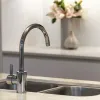Water heaters, in a lot of ways, are your home’s forgotten appliance. If you’re like most homeowners, you probably don’t service your water heater regularly. As long as hot water is coming out of the faucet, all is well. Right?
Well… sort of. Most water heaters need more attention than most people give them. There may be festering problems that cause the water heater to break down. There could be safety concerns, too.
Let’s consider some of the safety and operation-related issues that can crop up with water heaters. We’ll start with the serious stuff — actual safety hazards — and move on to nuisances such as leaks, water damage, and part failures.
Water heater CO, gas leaks, and electrical issues
Most water heaters in our area are powered by natural gas. They’re atmospheric combustion appliances and, as such, produce exhaust gasses that can be dangerous if you breathe them in.
One of those gasses is carbon monoxide or CO. Maybe you’ve heard of it?
We’ve written at length about this issue in the past, and you can see our blog on carbon monoxide safety for more info. Regarding water heaters, however, the biggest CO-related issue is ventilation.
Ensuring proper ventilation for your gas water heater
The quality of your water heater installation is really important. Not just because of how it affects hot water delivery throughout your home, but in terms of the safety of the unit itself.
If the vent pipe has the wrong slope, CO could backdraft into your home.
You’ll need to verify that the slope is within manufacturer specs. Ideally, your installer did this when they audited the installation… if they audited it. But if you’re not sure whether your unit’s vent pipe slope is within spec, it’s a good idea to have it checked out.
Another issue we see is the venting of water heaters into chimneys. It’s fairly common in older homes, but it can be dangerous when you’ve got an exterior chimney and/or an unlined masonry chimney that’s prone to cracking. The porous surface and/or temperature differences between the outdoors and the gas inside the chimney can cause CO to enter your home.
The bottom line: It’s a good idea to book a combustion safety test for your gas water heater. And if your vents into a chimney, you should have it tested.
Water heater gas leak safety
Did you know that the infrastructure surrounding your water heater can pose a gas leak hazard? If you smell gas inside your home, the first thing you should do is leave your home and call your gas company.
That being said, it’s important to ensure that your gas can easily be shut off. All too often, we see old gas shutoff valves that are stuck in place or nearly destroyed by rust and corrosion.
If you can’t turn your gas shutoff valve, that’s a safety hazard.
You’ll need to have a new one installed. We check your gas shutoff valve as part of our combustion safety test and when we service your gas furnace for the heating season.
Water heater electrical issues
Electric water heaters may not pose a CO or gas leak hazard, but they can have safety issues of their own. More often than not, it comes down to installation.
Some contractors don’t use the right size wire or breaker for the water heater.
When they don’t, the water heater is more likely to trip the breaker. In some cases, it’s also prone to blowing the breaker or a fuse. It’s important to ensure that the wire and breaker size is the same as what the unit manufacturer specified.
Water heater leak prevention
Other water heater issues may not put you in any immediate danger, but they sure can cause damage to your home! We’re talking, of course, about leaks.
Is the pressure release valve piped outside?
It should be. Otherwise, you could experience a pretty nasty leak.
A properly installed water heater includes components for relieving pressure inside the system. There should be a pressure release valve (PRV) and a thermal expansion tank. These components work together to ensure that any excess pressure from the street or the heating of the water inside your tank can’t overwhelm the system and damage your home’s plumbing.
When there’s too much pressure, the PRV will relieve it and dump out the extra water that shouldn’t be inside the system. If it’s pumped outside the way it should be, you’re good.
But if it’s not, well… the system might dump it inside your crawlspace, garage, or wherever your water heater is. That’s not good.
Just remember it’s a good idea to verify that your PRV pumps water to the outdoors.
Is there rust or corrosion on the tank or pipes?
Over time, your old water heater may start to rust. This tends to happen faster when the water heater is in a damp crawlspace. In addition, old copper pipes can corrode and wear thin. These issues can cause slow leaks resulting in big damage.
There’s also a dedicated drainage valve on the bottom of your water heater tank. We see these leaks a lot, too.
Check your tank and pipes for signs of corrosion and, in particular, actual water leaks. There may not be any damage yet, but there could be if you don’t catch it soon enough!
Concerned about water heater safety? We can help.
If you’ve never had your water heater serviced and you’re concerned about CO, water leaks, or other issues, give us a shout! We service and install all kinds of water heaters at homes throughout Metro Atlanta.
We’ll take a look at your water heater and surrounding infrastructure to determine whether you have any problems. For gas water heaters, we’ll also perform a combustion safety test, so you can know for sure that you’re not at risk of a dangerous CO leak.
Give us a call at (404) 798-9672 today, or schedule service online!






